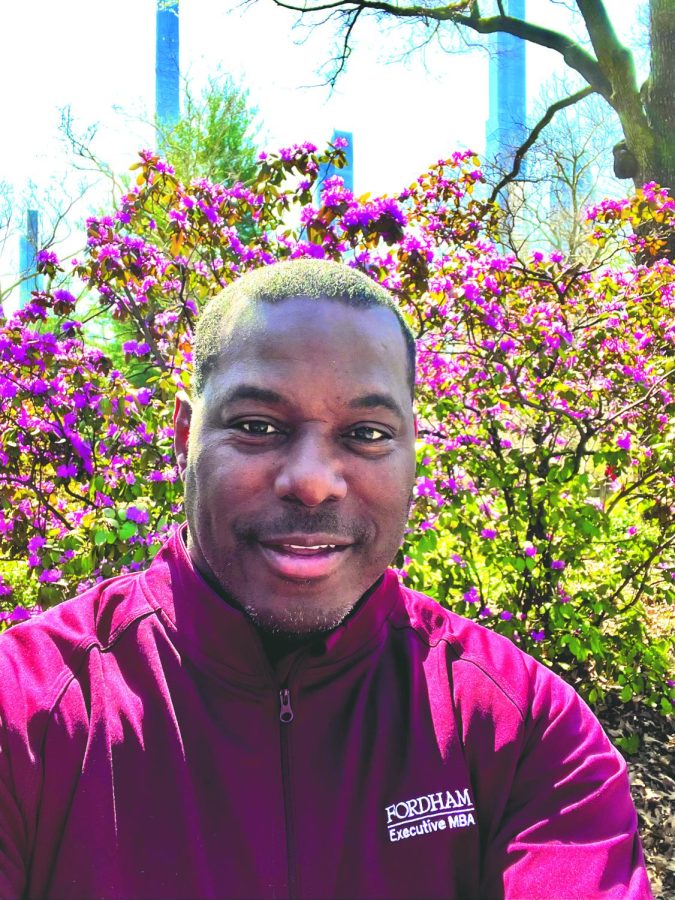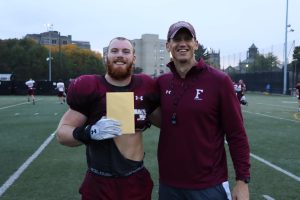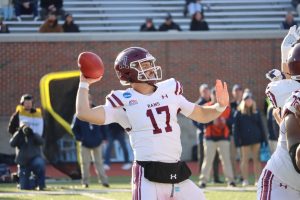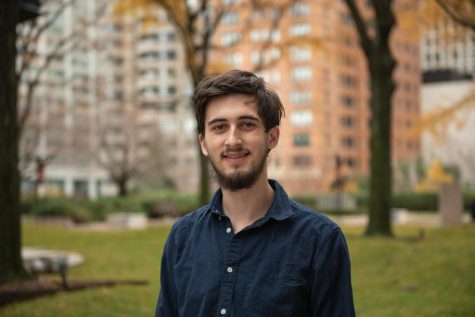Former Super Bowl Champion Pursues Executive MBA at Fordham
Byron Chamberlain lives in LA and is attending the Gabelli Graduate School of Business
COURTESY OF BYRON CHAMBERLAIN
Chamberlain draws a lot of parallels between his classroom work and the experiences he has had within various organizations.
April 13, 2023
Byron Chamberlain is not a typical Fordham student. In the 1990s, he won two Super Bowls playing for the Denver Broncos. In the 2000s, he ran the Byron Chamberlain Foundation to support underserved communities. And today, he is pursuing an executive master’s of business administration (MBA) degree at the Gabelli Graduate School of Business, at Lincoln Center.
The executive MBA program is an accelerated two-year program that is condensed into long lecture sessions. This encourages the students — who are almost exclusively professionals in their fields — to be highly engaged and invested in the coursework. The classes demand a lot of notetaking, but Chamberlain said he enjoys the challenge.
“It’s a lot of material, so you’ve got to cram in a lot. That’s what makes it very unique and very challenging as well,” Chamberlain said. “You are trying to digest a lot of information and retain it.”
Chamberlain currently lives in Los Angeles and commutes once a month, flying with a classmate into New York City to attend classes and immerse himself in what he calls “the on-campus, in-classroom feel,” something that was essential to him. Chamberlain also cited the respect and honor the program has as important sources of pride for him.
“When I tell people I’m at Fordham, their eyes light up because of the respect that the university has,” Chamberlain said.
“(Those early years) were a formative experience because I saw how a first-class organization is run.”Byron Chamberlain
He has also enjoyed meeting and working with his classmates. The challenging material is balanced by interesting group work and the productive atmosphere of a classroom with approximately 20 students. Working with people from all backgrounds sparks Chamberlain’s passion. He has bonded with his cohort, and they often engage socially outside of the classroom.
“There’s people working in finance and business. I have a friend in the cohort who works for the New York Knicks,” Chamberlain said. “We’ve made genuine friendships; I’ve been to a couple of Knicks games.”
The degree is a goal of Chamberlain’s, as he wants a breadth of opportunities to open up for him. Looking to expand his career, he thinks the versatility offered by the degree is one of its best attributes. He originally began the program in 2019 but took leave due to the COVID-19 pandemic.
“I just didn’t feel comfortable at that time traveling across the country,” Chamberlain said. “A lot of unknowns back then, a lot of information and misinformation out there.”
He remained in contact with Francis Petit, the program director, and returned in 2023 to work toward completing the degree.
“I think that’s the biggest thing about the program for me: It’s the people.”Byron Chamberlain
Despite the long commute — with jet lag between the West and East Coasts being an exhausting factor — he persists. It’s a natural effect of the way he sees the world, shaped by his experience in the NFL.
“I feel like anything that’s worth achieving is going to be difficult,” Chamberlain said. “You’re going to have to make some sacrifices and have some uncomfortable moments at times.”
His journey, marked by a long and successful NFL career, was far from easy. He was a highly touted tight end coming out of high school and was recruited by several big-name schools in some of the toughest conferences — Pacific-12, Atlantic Coast Conference and the Big Ten. He chose the University of Missouri for its broadcast journalism program and spent three years there.
He wasn’t entirely comfortable there and transferred to Wayne State College in Nebraska. The smaller institution allowed him to focus on his academics, and he was drafted by the Denver Broncos in 1995; he returned to Wayne State and completed his undergraduate degree in 2008 after retiring from the league.
He played for the Broncos from 1995 to 2000, winning both the 1998 and 1999 Super Bowls. There, he played with football legends including Shannon Sharpe and John Elway. He witnessed a team and an organization committed to excellence, and it paid off for him in the long run.
“(Those early years) were a formative experience because I saw how a first-class organization is run,” Chamberlain said of his Super Bowl years, which he argued began when he first joined the team, as Head Coach Mike Shanahan built up the roster.
Chamberlain then left for the Minnesota Vikings where he played some of his best football and then played for the organization now known as the Washington Commanders. He finished his career back where he started — with the Broncos — before retiring in 2005.
In 1999, Chamberlain created his foundation. From then until 2012, he raised money partnering with other foundations to give back to underserved communities. He worked with Magic Johnson’s foundation to raise money to fight HIV/AIDS and Soles for Souls, a nonprofit that sent over 100,000 shoes to African nations in 2012.
“There are people that truly need help, and they are everywhere,” Chamberlain said. “I have been blessed with so many opportunities that I had an obligation to help those underserved people. It brought me joy to be in that position.”
When thinking about Fordham, Chamberlain believes he brings a unique perspective to the university and the Gabelli program. “I understand how organizations are run, successful ones as well as dysfunctional ones, because I have been part of both,” Chamberlain said. “I know the difference, and I see the difference.”
It invariably impacts the material he learns in the classroom. He has experienced many events and movements across all echelons of an organization, and it is exciting for him to actually study it in a classroom setting. The theory and practice come together.
Chamberlain called the executive MBA program one of the best academic experiences he has ever had. Surrounded by people of all backgrounds, he believes the collaborative and communicative courses are the greatest aspects of the work he does at Fordham.
“I think that’s the biggest thing about the program for me: It’s the people,” Chamberlain said.














